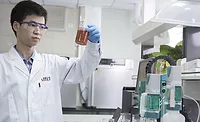Sustainability: A Challenge and an Opportunity

Sustainability has been a hot topic for many years, but it seems to be experiencing a resurgence in recent months. I had the opportunity to listen to a presentation by DSM at the European Coatings Show this past March, and was impressed with the company’s aggressive sustainability targets. I wanted to learn more about DSM’s perspective, and recently reached out to Helen Mets, President DSM Resins & Functional Materials, to get her thoughts on the topic.
PCI: What do you think of the idea that companies either need to focus on performing well financially or contributing to a better world?
Mets: Not only is that idea nonsense, but it’s unfortunate that some companies still believe it and operate accordingly. With our world facing unprecedented challenges – including climate change, plastic pollution and depleting natural resources – more than ever, businesses need to look beyond their balance sheets and understand that doing well by doing good is the only sustainable way to operate.
Time is not on our side. When it comes to sustainability, we simply can’t hesitate or delay – if we truly want to make a difference for future generations, then we have to move fast. Nor can we get away with half measures. For too long, much of the business world has viewed “sustainability” as an afterthought; organizations have approached it simply as a box-ticking exercise – rather than integrating it into daily business.
I’m proud that DSM is both making a positive impact and performing well. For example, we’ve made it on to Fortune magazine’s list of “Companies that are Changing the World” three years in a row, and our share price has also more than tripled over the last decade. Contributing to a better world is central to our business strategy – and we’ve proved that it works.
PCI: What are the global megatrends that are driving sustainable development in general?
Mets: Globally, we are witnessing a paradigm shift within the resources industry. 20 or 30 years ago, concepts such as sustainability and clean energy were, for the most part, exactly that - concepts. Now, these ideas are central to business strategies. It’s no coincidence that the leading oil and gas producers, to offer an example, are repositioning themselves as “energy companies”.
More and more, consumers are holding the business world to account. Companies and their shareholders understand that being futureproof – and profitable – also means being sustainable and acting in the best interests of people and planet. Often, making this leap means accelerating innovation, and being willing to leave behind the tried-and-tested and find a new, better way of doing things.
At DSM, we aim to use our scientific know-how to develop sustainable solutions that outperform conventional market alternatives. “Sustainability”, as we see it, is both a challenge and an opportunity.
PCI: Where does sustainability fit in the world of coatings?
Mets: Increasingly centrally, I hope. It’s a sad fact that the coatings industry has, historically, been one of the more polluting industries in manufacturing. But change is on the horizon, and I’m glad that there is growing awareness among our industry partners of the need to operate sustainably within our planetary boundaries.
At DSM Resins & Functional Materials (DRF), for example, we look to integrate sustainability by helping to create healthy living environments, reducing our impact on climate change, eliminating waste and enabling a circular economy. From pioneering plant-based paint resins to developing sustainable seed coatings and creating fully recyclable carpets, our innovative solutions are designed to meet customer and societal demands in more sustainable ways.
PCI: DRF recently announced some ambitious sustainability targets for its operations. Can you go into these in detail?
Mets: Indeed, we have recently introduced a set of sustainability targets that outline an ambitious path forward – a path that will see us both reduce the impact of our operations and improve the sustainability value of our product portfolio. By putting in place definite objectives and clear improvement strategies, we’re making sure we tackle these key issues in concrete ways for which we can be held accountable.
Above all, our operational sustainability targets are aimed at reducing the environmental impact of our production processes at our sites around the world. These targets include lowering our greenhouse gas emissions by 30% in absolute terms by 2030, compared to our emissions in 2016. In addition, by 2020, we will reduce all emissions to air from our operations by 40% compared to 2015, and we will have zero waste to landfill by 2022.
PCI: What sustainability goals does DRF have for its product portfolio?
Mets: Our product portfolio sustainability targets for DRF are aimed at developing the most sustainable product portfolio within our industry. In particular, we will accelerate the phase-out of all chemicals of high concern from our finished products. We have already started this journey, and it’s our ambition to have no sales of products containing chemicals of high concern by 2025.
Furthermore, we aim to reduce indirect value chain emissions by 28% per ton of product produced by 2030, compared to 2016. Finally, we have committed to ensuring that, by 2030, at least 30% of the raw materials we source are bio-based and/or recycled materials.
All in all, our sustainability targets will help us take an uncompromising leadership position on sustainability in the coatings industry. The NGO Chemsec recently went as far as describing these targets as a “major earthquake” for the coatings industry. Personally, I see it as acting responsibly in order to leave the world a better place – for our children and our children’s children.
Looking for a reprint of this article?
From high-res PDFs to custom plaques, order your copy today!





